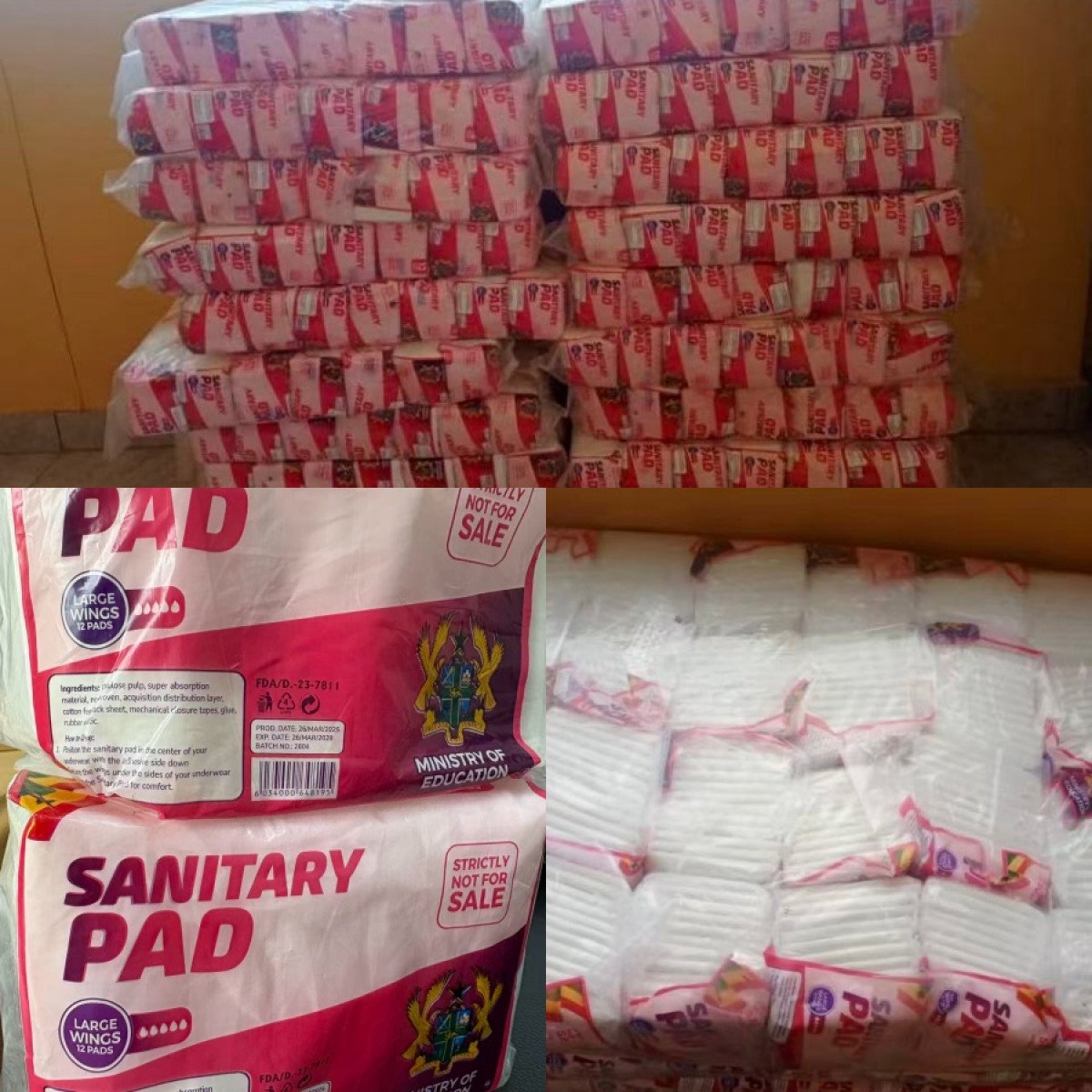A recent investigation by customs and government oversight bodies has revealed that large volumes of sanitary pads distributed under the government’s free sanitary pad program for schoolgirls allegedly originate from Nordiq Hygiene Care Industry, a Tema-based factory owned by foreign shareholders.
Packaging reviews traced through FDA registration numbers confirmed Nordiq as the source. The company, registered in 2017 with a stated capital of GHS 2.84 million and employing just 34 staff, has long claimed significant revenues in Ghana cedis but declared minimal tax contributions.
GMP Compliance Failures and Health Risks?
Independent assessments have identified alleged serious breaches of Good Manufacturing Practice (GMP) at Nordiq’s facility:
• Poor Seal Integrity: Laboratory and field reviews show that many of the pads have alleged weak packaging seals. This allows moisture, bacteria, and dust particles to penetrate—conditions known to compromise product sterility. In sanitary pads, such contamination can directly expose adolescent girls to urinary tract infections (UTIs), yeast infections, and skin irritation.
• Inadequate Production Controls: GMP requires strict control of humidity, temperature, and hygiene in the production line. Investigators noted some lapses in these controls, raising the likelihood of microbial growth during storage. Scientific studies show that poorly stored absorbent products can harbor Staphylococcus aureus and E. coli, which in severe cases can cause reproductive tract infections and even toxic shock syndrome (TSS).
• Substandard Storage Facilities: Finished goods were reportedly stockpiled without proper ventilation or pest protection. GMP standards demand controlled environments for absorbent hygiene products; without these, the products degrade quickly, losing absorbency and safety.
Public health experts stress that schoolgirls, many of whom rely on this government program as their only access to sanitary protection, are particularly vulnerable. Any lapse in hygiene standards places them at higher risk of infections that may have long-term consequences for reproductive health and overall well-being.
Alleged Smuggling and Fiscal Irregularities
Investigative reports also indicate that Nordiq has allegedly imported finished sanitary pads from China and Côte d’Ivoire, disguising them as raw materials to exploit Ghana’s tax exemptions for local manufacturers. According to the September 5, 2025 report by MyDailyNewsOnline , Nordiq declared 49 containers as “non-woven fabric” between June and July 2025. Evidence suggests these shipments contained finished sanitary pads, allowing the company to evade duties worth an estimated USD 380,000.
This practice not only deprives Ghana of vital revenue but also bypasses regulatory inspections intended to safeguard product safety. Smuggled or mislabeled pads are unlikely to undergo full FDA quality checks, raising further doubts about their compliance with Ghana’s public health standards.
When this issue was first reported in the media, the Managing Director of the company, Dina Safwan Shoueiry, in an interview, shot down the accusations of deploying clever attempts by her outfit to evade the payment of taxes.
“....We are aligned in taxes. We comply with payment, we also conduct auditing. We are hundred percent (genuine). Do you want us to give you all the indices so you can publish them?
I would be gladly, happily, more than extremely happy to open documents. We are the people who are the most welcoming….monthly audits, yearly and not only are we auditing, we pay taxes and sometimes we pay penalties (if we err)….….we are the first company in sub-saharan Africa to manufacture diapers and sanitary pads….. We learn and we are happy to learn. We are not saying that we are 100%.... We’ve done some mistakes when we started and…they have corrected us, and they did not correct us without paying penalties. So when we say that we are genuine,we are truly a genuine company. We have been operating under the laws (of Ghana dutifully),” she told Peacefmonline..
On the specific allegations of importation of 49 containers of finished sanitary pads in the months of May & June 2025, and mislabeling them as raw materials, the MD, while confirming bringing down the exact quantity of materials, flatly denied that they were sanitary pads.
According to her, the goods were “non-woven fabric”, raw materials used in the manufacturing of sanitary pads.
“Why, there is no customs? There is no port?…. Or you don’t believe in Ghana?.... Yes, we have brought in some non-woven because we have supplied; we have produced and we have supplied women pads. It is not for what is coming; it is for what is gone. We have already supplied women pads. Do you understand?....(So the 49 containers) it was a mixture of non-woven because when you want to produce women pads, you need PE film, fluff pulp, you need tissue, there are so many other things that you need to produce. But we always have some in stock because we are preparing for what is coming because as we speak today, we are producing,” she replied.
Reacting to the claim that Nordiq Hygiene deliberately abused Customs Procedure Code (CPC) 40E73, the policy intended solely for sanitary pads and raw materials import, Ms Dina Shoueiry dismissed any suggestion of wrongdoing on her company’s part, adding that so long as their actions are consistent with the country’s laws, then they cannot be accused of contravening customs rule.
“if it’s something we have the right to use, I’m sure we have…we are exempted because we are producing,” she indicated.
Broader Implications
Industry watchers argue that Nordiq’s combination of GMP failures, weak compliance, alleged smuggling, and low tax contributions undermines Ghana’s 24-Hour Economy and local industrialization agenda, while disadvantaging compliant local manufacturers who invest in ISO certification, GMP systems, and tax obligations.
Stakeholders are urging the FDA, GSA, GRA, and Ministry of Education to conduct urgent inspections of Nordiq’s operations, enforce GMP compliance, and ensure that only safe, verifiably local sanitary products are supplied under program designed to protect the health and dignity of Ghanaian schoolgirls.








